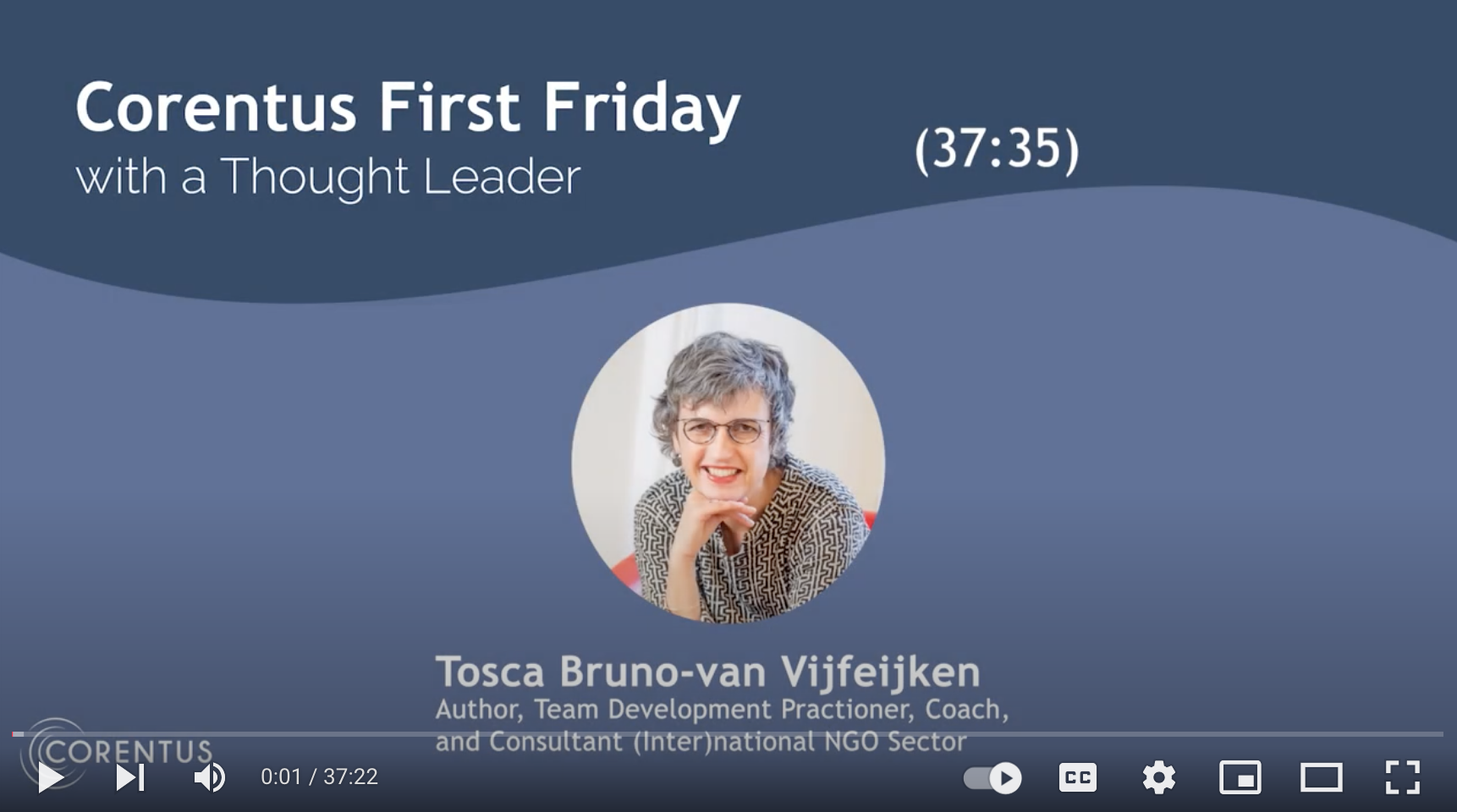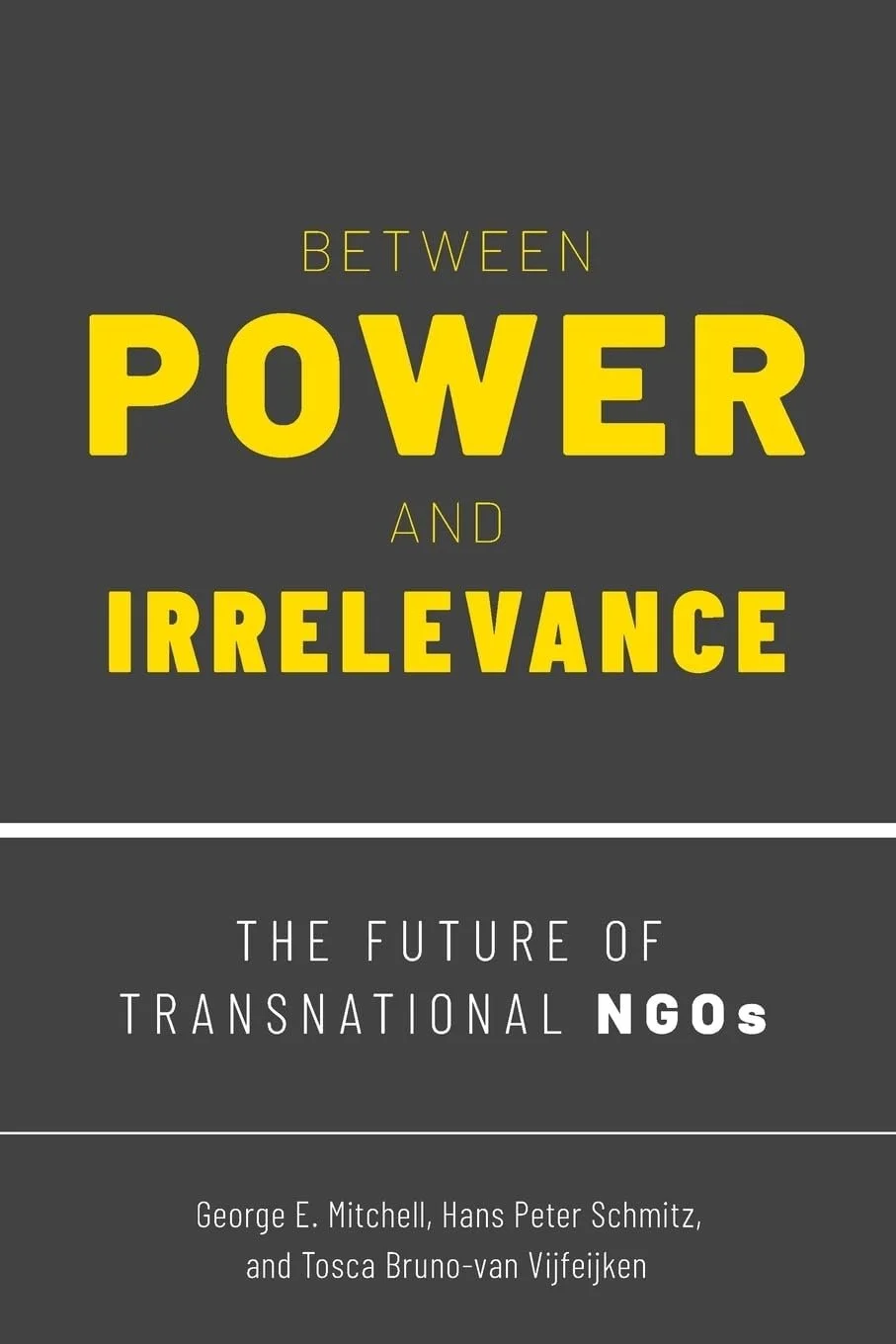Tosca Bruno-van Vijfeijken Organizational Legitimacy
Tosca Bruno-van Vijfeijken explains how the grounds are shifting for organizational legitimacy across all organizations (nonprofit, private, and government) as legitimacy is socially constructed. Tosca shared her insights with us and our Community of Professionals Advancing Team Effectiveness during our First Friday with a Thought Leader event.
For you from Tosca & Corentus
Key Insights, below & YouTube Video (37:35)
from the First Friday with a Thought Leader eventTosca is a Corentus Core Practitioner, view bio
About Tosca Bruno-van Vijfeijken
Tosca Bruno-van Vijfeijken is a consultant, facilitator, leadership coach, and team coach who has worked on international as well as domestic nonprofit and NGO organizational effectiveness issues for 30 years in practice and in academia. She focuses on leadership development, change management, governance, and organizational culture, and currently works as Principal Consultant at Five Oaks Consulting, Inc. Tosca is also the co-author of “Between Power and Irrelevance: The Future of Transnational NGOs.”
As an alum of Corentus team coaching courses and programs, and an experienced facilitator and adult educator herself, she was impressed by the quality of Corentus’ training methodology as well as its content. Tosca also appreciates Corentus’ culture, as well as its focus on the provision of content thought leadership.
KEY INSIGHTS |Organizational Legitimacy
Shifting expectations of leadership: The discussion centers on how leadership expectations are evolving beyond traditional internal organizational focus to encompass broader responsibilities towards external stakeholders like the community and customers.
Multi-directional accountability: Participants highlighted a need for leaders to be accountable not just to boards and funders, but also to the communities they serve and the broader societal impact of their organizations.
Agility and uncertainty: The rapidly changing landscape requires leaders to be comfortable navigating uncertainty and adapting their strategies accordingly.
Impact and value: Emphasis is placed on measuring effectiveness not just through internal metrics but through tangible impact and value generated for external stakeholders.
From internal to external focus: Peter Gosline, a community member, observes a shift "from thinking about the survival of the organization or self to impact on community, customers, society." This highlights the growing importance of a leader's role in considering the organization's impact beyond its immediate boundaries.
Community-driven leadership: Grace Kim, a community member, emphasizes a move "from elite-driven leadership to community-driven leadership," urging for a deeper understanding and valuing of all community members. This underscores a need for leaders to prioritize diverse perspectives and equitable outcomes.
Redefining effectiveness: Gary Bond, a community member, emphasizes the need to revisit and redefine effectiveness in terms of "impact, value, and clear communication" for both internal teams and external stakeholders. This stresses the importance of transparent communication and tangible results beyond internal metrics.
Adapting governance: Peter Gosline, a community member, proposes that governance structures, including selection, term limits, and representation, can play a crucial role in driving these shifts in leadership expectations.
Navigating uncertainty: Grace Kim acknowledges the challenge of maintaining a clear vision in a rapidly changing world, emphasizing the need for leaders to develop "agility to sit in the uncertainty." This highlights the importance of adaptability and comfort with ambiguity as key leadership qualities.
“Legitimacy is based on the perception or assumption that the organization is desirable, proper, and appropriate within a system of norms, values and beliefs”
– Tosca Bruno-van Vijfeijken
First Friday with a Thought Leader is a monthly live event for the Corentus Community of Professionals Advancing Team Effectiveness.
Interested in being a member of this professional community and/or receiving our monthly enewsletter? Let us know:




